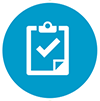Before surgery
You will have an appointment before the day of your mastectomy to make sure you are fit and safe for surgery. This is called the pre-anesthesia assessment.
Pre-anesthesia Assessment
During the assessment a nurse will ask you about your medical history, the medications you take and will talk to you about any special needs you might have after your surgery.
- The assessment may be done over the phone or in-person at the hospital.
- Patients who don’t have other medical conditions are usually assessed over the phone.
- The pre-anesthesia clinic will phone to tell you whether you will have an assessment by phone or in-person at the hospital.
- The pre-anesthesia clinic will also tell you the date and time of the assessment appointment.
If you have a telephone assessment appointment:
- Make sure the hospital has a phone number where you can be reached at during the day.
- The nurse will call your daytime number around the time of your appointment. Please keep in mind the nurse may fall behind schedule with other patients. The nurse may call you at any time within the hour of your scheduled appointment.
If you have an in-person hospital assessment appointment:
- Please check-in at B-wing,1st floor, room 11 (B1 11).
- You will meet with a nurse, and may also meet with a pharmacist and the doctor (the anesthesiologist) who will put you to sleep in the operating room when you have surgery.
- Please eat and take all your regular medications before you come to this appointment.
What do I need to bring to the in-person hospital assessment appointment?
- If you do not read or speak English, it is helpful to bring someone who will be your translator.
- Please bring only 1 family member or friend to the appointment.
 Please bring:
Please bring:
- Your Ontario Health Card.
- The name and telephone number of your family doctor.
- The names and telephone numbers of any specialists who treat your medical conditions.
- All of your medications in the containers they came in. These include pills, inhalers or puffers, injections, and eye drops. Also bring any herbal medicines or vitamins you take.
- A paper copy of this guide.






